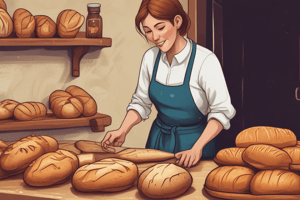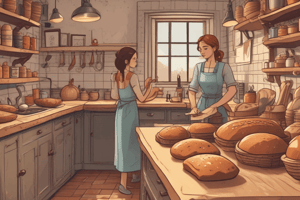Podcast
Questions and Answers
What is the primary ingredient in bread that provides structure to the dough?
What is the primary ingredient in bread that provides structure to the dough?
- Water
- Salt
- Yeast
- Flour (correct)
Which type of bread relies on chemical leavening agents for rising?
Which type of bread relies on chemical leavening agents for rising?
- Yeast bread
- Sourdough bread
- Flatbread
- Quick bread (correct)
What characteristic is necessary for high-quality bread related to gluten?
What characteristic is necessary for high-quality bread related to gluten?
- High yeast content
- Strong gluten strands (correct)
- Low gluten strength
- Excess moisture
What process do yeast breads require that differentiates them from quick breads?
What process do yeast breads require that differentiates them from quick breads?
Which type of bread includes items such as cookies, pies, and pastries?
Which type of bread includes items such as cookies, pies, and pastries?
Why is it important to monitor each ingredient in modern bread-making?
Why is it important to monitor each ingredient in modern bread-making?
Which flour type is generally preferred for making bread due to its gluten content?
Which flour type is generally preferred for making bread due to its gluten content?
What is a likely cause of uneven color in baked bread?
What is a likely cause of uneven color in baked bread?
What is the purpose of benching in bread making?
What is the purpose of benching in bread making?
What is a common challenge faced in baking poor-quality bread?
What is a common challenge faced in baking poor-quality bread?
Which defect is usually associated with a dough that has not been mixed properly?
Which defect is usually associated with a dough that has not been mixed properly?
What happens if the oven temperature is too low during baking?
What happens if the oven temperature is too low during baking?
Which step involves placing the dough into the correct baking pan?
Which step involves placing the dough into the correct baking pan?
What must be observed when preparing the yeast mixture?
What must be observed when preparing the yeast mixture?
Which stage in the baking process involves forming the dough through gluten formation?
Which stage in the baking process involves forming the dough through gluten formation?
What happens during the 'punching down' phase of bread making?
What happens during the 'punching down' phase of bread making?
What could cause bread to have a tough texture?
What could cause bread to have a tough texture?
Why is kneading important in the bread-making process?
Why is kneading important in the bread-making process?
Which issue is typically linked to the use of an improper oven temperature during baking?
Which issue is typically linked to the use of an improper oven temperature during baking?
What is a common cause for a bread loaf to be described as 'heavy'?
What is a common cause for a bread loaf to be described as 'heavy'?
During which step is the dough allowed to grow in size for the first time?
During which step is the dough allowed to grow in size for the first time?
Which of the following stages involves removing excess gas from the dough?
Which of the following stages involves removing excess gas from the dough?
What is the purpose of shaping the dough?
What is the purpose of shaping the dough?
What is a common reason for scalding milk before adding it to the dough?
What is a common reason for scalding milk before adding it to the dough?
What is the primary function of bread flour in bread making?
What is the primary function of bread flour in bread making?
How does salt affect the fermentation process in bread making?
How does salt affect the fermentation process in bread making?
What role does liquid play in the preparation of bread dough?
What role does liquid play in the preparation of bread dough?
What is the purpose of adding sugar to yeast before incorporating it into the dough?
What is the purpose of adding sugar to yeast before incorporating it into the dough?
Which ingredient serves as a leavening agent by converting sugar into alcohol and carbon dioxide?
Which ingredient serves as a leavening agent by converting sugar into alcohol and carbon dioxide?
How does using milk in the dough affect the final product?
How does using milk in the dough affect the final product?
What effect does shortening have on the handling of dough?
What effect does shortening have on the handling of dough?
What happens to dough when salt is omitted from the recipe?
What happens to dough when salt is omitted from the recipe?
What is the primary function of sugar in the bread-making process?
What is the primary function of sugar in the bread-making process?
What will happen if the flour absorbs too much liquid during bread-making?
What will happen if the flour absorbs too much liquid during bread-making?
What temperature range is optimal for allowing dough to rise?
What temperature range is optimal for allowing dough to rise?
What indicates that the dough has properly risen?
What indicates that the dough has properly risen?
What characterizes 'old' dough?
What characterizes 'old' dough?
Why is it important to preheat the oven before baking bread?
Why is it important to preheat the oven before baking bread?
How can you tell if a loaf of bread is done baking?
How can you tell if a loaf of bread is done baking?
What is a potential effect of using liquid at an incorrect temperature on the yeast?
What is a potential effect of using liquid at an incorrect temperature on the yeast?
Flashcards are hidden until you start studying
Study Notes
Introduction to Breads
- Bread making dates back approximately 8,000 years, originally made from wheat or starchy materials mixed with water.
- Modern bakeries utilize mechanized processes, closely monitoring ingredients and techniques.
- Bread is a staple food composed of grains ground into flour, moistened, kneaded into dough, and baked.
Types of Breads
- Yeast Bread: Depends on yeast for leavening; requires longer fermentation times. Ingredients include flour, water, salt, and additional components.
- Quick Bread: Uses chemical leavening agents for a swift preparation process; includes examples like muffins and cupcakes.
- Shortbread: Encompasses cookies, pies, pastries, and biscuits.
Essential Ingredients and Their Functions
- Flour: Primary ingredient; constitutes gluten formation which provides structure. Variations include bread flour and all-purpose flour.
- Leavening Agent: Converts sugar into carbon dioxide and alcohol through fermentation, essential for dough rising.
- Liquid: Hydrates flour, typically water activates yeast and helps develop gluten. Milk may be used for enhanced flavor and nutrition.
- Salt: Adds flavor and controls fermentation speed; absence results in poor taste and rapid dough rising.
- Sugar: Fuels yeast, enhances flavor, and contributes to crust color.
- Shortening: Aids in dough handling and enhances texture; can be butter, margarine, or vegetable shortening.
- Fillings/Toppings: Should complement bread characteristics without making it soggy or dense.
Causes of Poor Quality Breads
- Appearance Defects:
- Irregular shapes from excess liquid, improper cutting, or uneven oven heat.
- Color issues (too pale, too dark, uneven) caused by incorrect baking conditions or mixing.
- Inside Appearance Defects:
- Poor color and texture issues stem from ingredient mixing errors, improper kneading, or baking times.
- Coarse cells indicate overmixing, while tough or heavy bread results from incorrect ingredient proportions.
Stages in the Baking Process
- Measuring & Mixing: Gather and mix ingredients to form dough.
- Fermentation: Allow dough to rise in a warm environment.
- Punching: Release built-up gases from dough.
- Scaling & Shaping: Divide and form dough into desired sizes and shapes.
- Panning & Proofing: Prepare dough for baking in appropriate pans; let rise once more.
- Baking: Bake until golden brown.
- Cooling & Storing: Cool completely before packaging to ensure shelf life.
Mixing Process in Bread Making
- Uniform Distribution: Essential for yeast and sugar, helps develop gluten and creates a smooth, lump-free dough.
Guidelines for Effective Bread Making
- Adjust flour based on moisture absorption; avoid excess which can toughen dough.
- Maintain correct liquid temperature to ensure yeast activation.
- Allow dough to rise in a warm, draft-free environment.
- Recognize when dough has risen adequately; indentation should remain after pressing.
- Preheat the oven to ensure proper baking conditions.
- A loaf is properly baked if it sounds hollow when tapped and appears well-risen.
These essential points provide a comprehensive overview of bread making, encompassing ingredients, techniques, and potential pitfalls to avoid for optimal results.
Studying That Suits You
Use AI to generate personalized quizzes and flashcards to suit your learning preferences.




